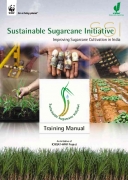WWF India
"My Ganga, my dolphin" - WWF-India's initiative to map the Ganges River Dolphin throughout 2800 km of the Ganges from 5th-7th October, 2012
Posted on 05 Oct, 2012 07:56 AMWWF-India, one of India’s leading conservation organizations with programmes and projects spread across the country, in partnership with the Uttar Pradesh Forest Department and under the aegis of the HSBC - supported “
The what, why and how of environmental flows: Presentations made during an IUCN training programme in Kathmandu, 2011
Posted on 03 Apr, 2012 01:42 PM Bagmati River at Pashupatinath Temple, Kathmandu, Nepal (Photo: IUCN\Stefano Barchiesi)
Bagmati River at Pashupatinath Temple, Kathmandu, Nepal (Photo: IUCN\Stefano Barchiesi)
Sustainable Sugarcane Initiative - Improving Sugarcane Cultivation in India - Training Manual developed by WWF India and ICRISAT
Posted on 09 Jun, 2010 01:25 AM Sustainable Sugarcane Initiative (SSI) is an approach to the cultivation of sugarcane, that can reduce inputs - water, chemical fertilizers, seed material and farm space - while improving sugarcane production significantly. It also reduces crop duration and provides a longer period of the cane crushing season to the sugar industry.
Sustainable Sugarcane Initiative (SSI) is an approach to the cultivation of sugarcane, that can reduce inputs - water, chemical fertilizers, seed material and farm space - while improving sugarcane production significantly. It also reduces crop duration and provides a longer period of the cane crushing season to the sugar industry.
This farm-based approach (as opposed to crop-based) also gives farmers options to grow intercrops, such as pulses to improve their income. Most importantly, SSI reduces the overall pressure on water resources and contributes to recovery of ecosystems. It conserves soil moisture, thereby allowing for growing of dryland crops in the same region.
SSI is inspired from the successful approach of System of Rice Intensification (SRI) paddy cultivation, which like SSI, originated from farmers and civil society to improve agricultural productivity while reducing pressure on natural resources.
Young Climate Savers programme:Teacher's manual on climate change and energy
Posted on 14 Oct, 2009 01:52 PMIn realizing this vision, WWF-India has partnered with Tetra Pak in designing the Young Climate Savers programme, aimed at imparting education on climate change in 200 schools across 10 cities in India through teacher training workshops and mainstreaming climate issues in the academic curriculum.